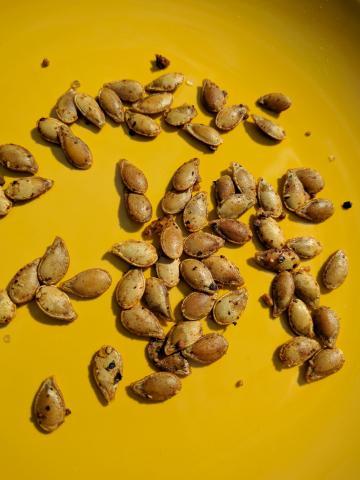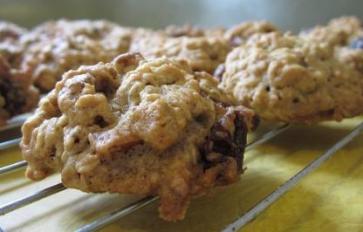
In the United States, pumpkins are the quintessential fall “fruit” – there are pumpkin patches, pumpkin carvings, pumpkin pies, pumpkin soup, pumpkin pancakes, pumpkin juice, pumpkin spiced lattes – and of course, pumpkin seeds. It’s not unusual to salvage some of those slippery seeds from the pumpkin’s guts and roast them in the oven for a fun snack that’s ready when you’re done carving the jack-o’-lantern.
Pumpkin gets far more love than its fellow squash cousins like zucchini – maybe that’s why its seeds get all the love, too. And maybe that’s why I never thought to try roasting butternut squash seeds until recently – but once I did, I knew I found a winner.
In fact, I prefer butternut squash seeds to pumpkin seeds. They’re smaller, crunchier, nuttier, and have a better all-around texture to me. Unfortunately, there aren’t as many seeds in a butternut squash as there are in a pumpkin – so you’ll just have to savor every last one.
The great thing about this recipe is that by skipping the step of rinsing the seeds, you can easily get this going while your main butternut squash recipe is cooking. (I recommend this one.)
If you’re still not convinced, check out these nutritional benefits:
Protein. These seeds pack a punch of protein – about 3 grams in a quarter cup of seeds.
Fiber. Squash seeds of all kinds are an excellent source of fiber. Butternut squash seeds have about 4 grams of fiber in a quarter cup.
Vitamins and Minerals. Butternut squash seeds are a great source of Vitamins A and C, as well as minerals such as calcium, potassium, zinc, and iron.
Linoleic and Oleic Acids. Squash seeds are full of polyunsaturated omega-6 fatty acid and the same monounsaturated acid that is found in olive oil.
And here’s the impact all those goodies will have on your health:
Relieves Arthritis. Squash seeds are anti-inflammatory and can ease pain in stiff joints.
Stronger Bones. The zinc and calcium in squash seeds help build stronger bones.
Eases Gastritis. The fiber in squash seeds helps food digest quickly, and can cure constipation, diarrhea, and bloating.
Encourages Sleep. Squash seeds boast the amino acid tryptophan (the same amino acid in turkey that leads to Thanksgiving Day naps), which can help alleviate insomnia.
Regulates Diabetes. Squash seeds have been shown to decrease oxidative stress and help maintain blood sugar levels.
What You Need:
Squash Seeds
Olive Oil
Spices (your choice) – salt, pepper, garlic powder, onion powder, cayenne powder, etc.
What You Do:
- Preheat your oven to 275F.
- Gather your butternut squash seeds. You don’t need to rinse the “squash guts” off of them first, but remove as much of the stringy bits as possible with your hands.
- In a bowl, mix some olive oil with your preferred spices. The amount of olive oil you need varies based on how many seeds you have, but start with a teaspoon or two of oil – it doesn’t take much! My go-to spices are sea salt, freshly ground pepper, cayenne, garlic powder, and onion powder, but you can experiment to get the spiciness that you prefer. (Or sweetness! Cinnamon, sugar, and nutmeg turn these seeds into a sweet treat, as does a sprinkle of pumpkin pie seasoning.) You can also use a pre-mixed combination of spices (like Mrs. Dash or Old Bay) to save time. Try a dash of hot sauce if you like things spicy, or a dash of Worcestershire sauce for a pungent saltiness. Add some parmesan or nutritional yeast for a cheesy punch. Experiment – this is your chance to make the recipe truly yours!
- Mix the seeds into the oil and spices, making sure each seed gets covered.
- Spread in an even layer on a baking sheet covered with aluminum foil or parchment paper.
- Bake the seeds at 275F for 15 minutes, stirring once or twice to ensure even coating.
- Leaving the seeds in the oven, increase the heat to 350F and remove the seeds when they start to make popping noises – should be less than 5 minutes.
- Let cool, and place on a paper towel to soak up excess oil.
- Enjoy as a healthy treat! You can also add them to salads for a crunchy, healthy alternative to croutons.
Write in below and let us know what other seeds you’ve tried roasting!








